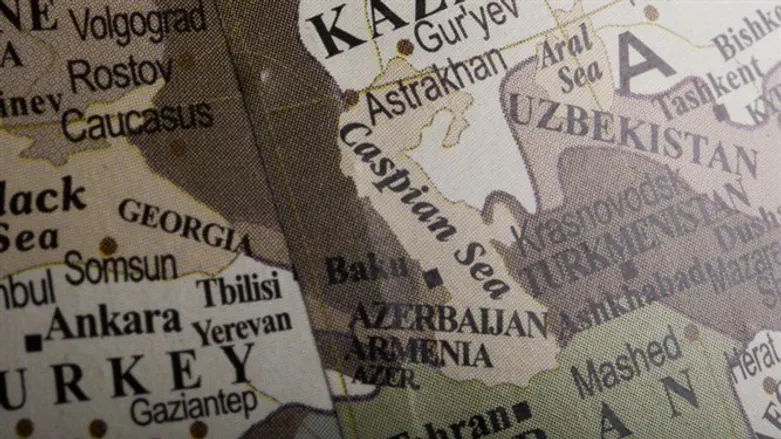
When the Iran-backed terrorist group Hezbollah announced Sept. 24 that a tanker carrying fuel headed for Lebanon had reached Syria, it marked the latest chapter in a trend that must be recognized as Iranian aggression.
A celebratory energy was in the air on Sept. 16 when Hezbollah had brought its first shipment of Iranian fuel into Lebanon, via Syria, as onlookers in al-Ain greeted the delivery by waving Hezbollah flags and throwing petals at one of the dozens of tanker trucks.
The U.S. and Israel, however, have nothing to celebrate. The deliveries violated American sanctions which were imposed on Tehran after former President Donald Trump had pulled out of the Iranian nuclear agreement in 2018.
It is incumbent upon world powers and policymakers to understand the fuel deliveries as part of a seemingly endless trend: Wherever Iran travels, instability follows. The same pattern holds in reverse: Wherever instability travels, Iran follows. Indeed, it was no surprise to see Iranian President Ebrahim Raisi cheer the U.S. “military failure” in Afghanistan last month.
Iranian fuel deliveries, in particular, represent one of the mullahs’ strategies for fomenting instability that extends beyond Lebanon.
Recently, from July 11 to August 8, nearly three-dozen Iranian vehicles (31 of them fuel trucks) illegally entered and exited Karabakh — the formerly Armenian-occupied territory which Azerbaijan reclaimed during the war between the Eurasian nations last year — through the Lachin corridor. Then, from August 11 to September 10, another 58 trucks entered Karabakh for various purposes. On September 12, Azerbaijan’s Ministry of Defense sent letters to Russia’s Ministry of Defense of Russia and Command of Peacekeeping Forces regarding the illegal entry of foreign vehicles into Azerbaijani territories where peacekeepers are temporarily deployed under the November 2020 cease-fire agreement signed by Azerbaijan, Russia, and Armenia.
Iran had also delivered fuel to Karabakh in April 2020 in defiance of Azerbaijan’s internationally recognized territorial integrity in the region, belying Tehran’s claims of neutrality toward the Armenia-Azerbaijan conflict and reflecting the regime’s strategy of creating a buffer zone between Azerbaijan and northwestern Iran, which is home to the Islamic Republic’s Azerbaijani minority.
Much like Hezbollah’s recent deliveries of Iranian fuel to Lebanon via Syria, Iran’s deliveries to Karabakh should be viewed from the lens of Tehran’s quest for regional hegemony — whether it be in the Middle East or in Eurasia’s South Caucasus region. One piece of that quest is undermining U.S. influence in any particular region, specifically through working to contravene sanctions. And that is where Armenia comes into play. Armenia has a well-documented history of acting as a sanctions-buster on behalf of Iran, including through Armenian banks’ track record of enabling Tehran’s obfuscation of payments to and from foreign clients.
In August 2019, America imposed sanctions on two Armenian companies over their business ties with Iran. Earlier in the same year, the U.S. Treasury Department sanctioned Armenia-based Flight Travel LLC for its connection to Iranian Mahan Air.
“Armenia has said its banking controls are strong and that Iran is unable to process transactions illicitly through Armenia’s banks. However, observers in the South Caucasus assert that Iran has used Armenian banks operating in the Armenia-occupied Nagorno-Karabakh territory to circumvent international financial sanctions,” noted the January 2020 Congressional Research Service report on Iran sanctions.
Armenia’s intentions vis-à-vis Iran largely fly under the radar but are transparent enough for the world to witness in plain sight. Armenian Prime Minister Nikol Pashinyan in October 2019 pledged to deepen Armenia-Iran relations “in spite of U.S. sanctions,” while former Iranian President Hassan Rouhani previously expressed appreciation for “Armenia’s stance towards illegal sanctions of the United States against Iran.”
Pashinyan’s remark came at a summit in Yerevan during which the EAEU (Eurasian Economic Union) — a Russian-led trade alliance then comprised of Armenia, Belarus, Kazakhstan, Kyrgyzstan, and Russia — approved the membership of Iran. Resembling Tehran’s ambitions, the EAEU seeks to offer a viable alternative to American hegemony on international trade. EAEU membership empowered Iran with the ability to export goods to the trade bloc’s five states with virtually no tariffs. Notably, the only EAEU member state that maintains a Deep and Comprehensive Free Trade Agreement (DCFTA) with the European Union is Armenia, making the continued growth of Iran-Armenia trade a precursor to Iranian commerce throughout Europe as well as a vehicle for circumventing U.S. and international sanctions.
Israel, which has a history of carrying out airstrikes in Syria to prevent Hezbollah weapon shipments from reaching their target, reportedly will not interfere with the Hezbollah-organized fuel shipments from Iran to Lebanon. The U.S. has also not indicated whether it is considering taking action over the Hezbollah fuel deliveries.
Yet it is essential that Israel and the U.S. name the recent Iranian fuel deliveries, in Lebanon and Karabakh, for what they are — aggressive attempts to destabilize the Middle East and Eurasia, to circumvent American sanctions, and to undermine the broader shared strategic interests of Jerusalem and Washington.
Jesse Bogneris an author and journalist. His memoir and social critique, The Egotist, has been translated into five languages. His work has been featured in The Daily Caller, MSN, The Huffington Post, The Jerusalem Post, American Thinker, and The Daily Wire. His book of articles, Tikkunim (Corrections), was released in January 2018.
